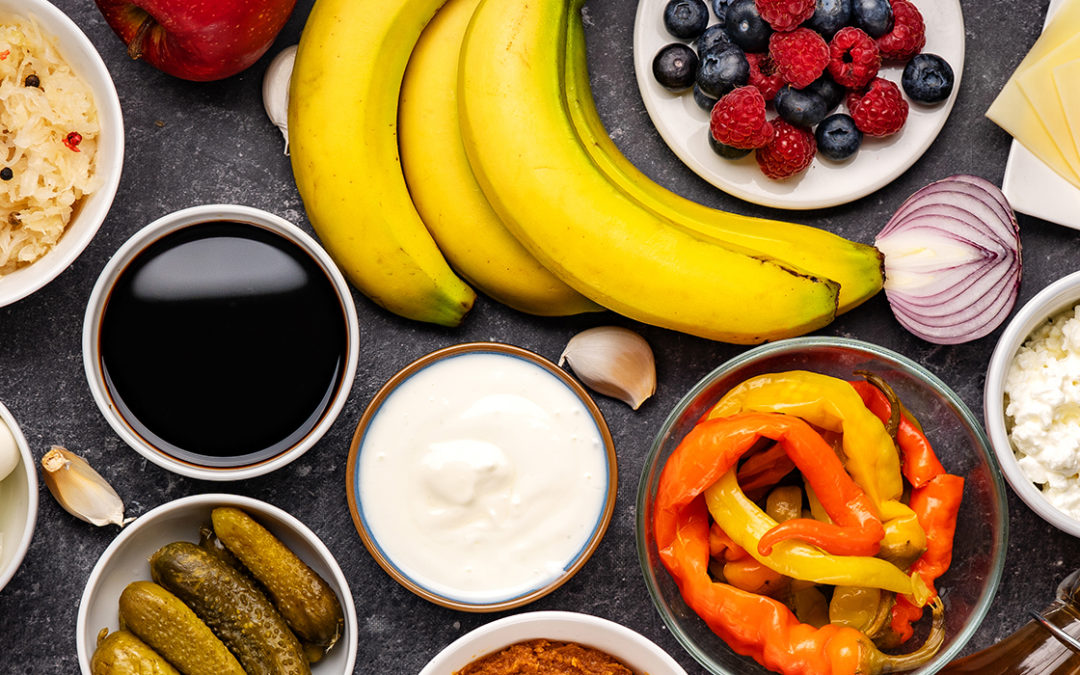Probiotics are beneficial bacteria, and prebiotics are food for these bacteria.
WHAT ARE PROBIOTICS AND PREBIOTICS?
Both prebiotics and probiotics are important for human health. However, they have different roles:
- PROBIOTICS: These are live bacteria found in certain foods or supplements. They can provide numerous health
- PREBIOTICS: These substances come from types of carbs (mostly fibre) that humans can’t digest. The beneficial bacteria in your gut eat this fibre.
The gut bacteria, collectively referred to as the gut flora, or gut microbiota, perform many important functions in the body.
Eating balanced amounts of both probiotics and prebiotics can help ensure that you have the right balance of these bacteria to keep your gut microbiota healthy.
WHY ARE THE GUT BACTERIA BENEFICIAL?
The good bacteria in your digestive tract help protect you from harmful bacteria and fungi.
Various studies on bacteria in the gut confirms that a wide variety of this good type of bacteria can aid in immune system functions, improve symptoms of depression, and help address obesity, among other benefits.
Additionally, some of your gut bacteria form vitamin K and short-chain fatty acids. Short- chain fatty acids are the main nutrient source of the cells lining the colon. They promote a strong gut barrier that helps keep out harmful substances, viruses, and bacteria. This also helps reduce inflammation and may have the potential to reduce the risk of cancer.
HOW DOES FOOD AFFECT THE GUT MICROBIOTA?
The food you eat plays an important role in the balance of good and bad gut bacteria.
For example, a high sugar and high fat diet negatively influences the gut bacteria and may contribute to insulin resistance and other conditions.
Once you regularly feed the wrong bacteria, they’re able to grow faster and colonize more easily, without as many helpful bacteria to prevent them from doing so.
Harmful bacteria and less healthy gut flora have also been associated with higher body mass index (BMI).
Studies have also shown that antibiotics can cause permanent changes in certain types of bacteria, especially when taken during childhood and adolescence.
Because antibiotic use is so widespread, researchers are now studying how this may cause health problems in people later in life.
WHICH FOODS ARE PREBIOTIC?
Before you go out and buy expensive prebiotic supplements, remember that many foods naturally contain them.
That’s because prebiotics are types of fibre found in vegetables, fruits, and legumes. People are not able to digest these types of fibre, but your good gut bacteria can digest them.
Foods that are high in prebiotic fibre include:
- Legumes, beans, and peas
- Oats
- Banana
- Berries
- Jerusalem artichokes (not the same as regular artichokes).
- Asparagus
- Dandelion greens
- Garlic
- Leeks
- Onions
One of the things your good gut bacteria do with prebiotic fibre is turn it into a short-chain fatty acid called butyrate.
Studies suggest that butyrate production in the colon cannot be maintained without adequate intake of prebiotic fibre.
WHICH FOODS ARE PROBIOTIC?
There are also many probiotic foods that naturally contain helpful bacteria, such as yogurt.
A high quality, plain yogurt with live cultures can be a fantastic addition to your diet if you want to add beneficial bacteria.
Fermented foods are another great option, as they contain beneficial bacteria that thrive on the naturally occurring sugar or fibre in the food.
Examples of fermented foods include:
- Sauerkraut
- Kimchl
- Kombucha
- Kefir (dairy and non-dairy).
- Some types of pickles (unpasteurized).
- Other pickled vegetables (unpasteurized).
If you’re going to eat fermented foods for their probiotic benefits, make sure they’re not pasteurized, as this process kills the bacteria.
Some of those foods can also be considered synbiotic, because they contain both beneficial bacteria and a prebiotic source of fibre for the bacteria to feed on.
Some examples of synbiotic foods are cheese, kefir, and sauerkraut.
SHOULD I TAKE PROBIOTIC SUPPLEMENTS?
Probiotic supplements are pills, powders, or liquids that contain live beneficial bacteria or yeast.
They’re very popular and easy to find, yet not all of them are worth your money. They do not all have the same types of bacteria or the same concentrations. There are also many products on the market making claims with no proof of efficacy.
They also usually do not come with fibrous food sources for the bacteria to eat, which can hinder their effectiveness if someone isn’t also eating those foods.
Some probiotic supplements are designed to carry the bacteria all the way to your large intestine for better effects, while others probably don’t make it past your stomach acid.
There are some individuals who should not take a probiotic, or who may experience worsened symptoms if they do, such as people with small intestinal bacterial overgrowth (SIBO) or people sensitive to ingredients in the supplement.
However, the right strains of probiotics can be incredibly beneficial for some people. It depends on the type of strain, product formula, the quality of the product, and storage.
As with all supplements, you may want to consult with a healthcare professional who’s knowledgeable about probiotics.
THE BOTTOM LINE
Keeping your gut bacteria balanced is important for many aspects of health.
To do this, eat plenty of both prebiotic and probiotic foods, as they will help promote the most ideal balance between good and bad gut bacteria.
Talk to your healthcare provider to make sure you’re eating the right amounts of each. It’s possible to go overboard or have side effects.

